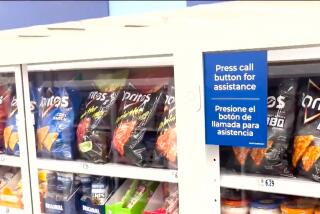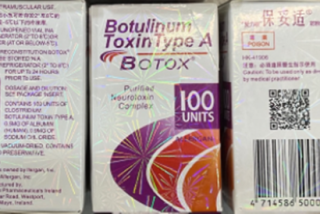Slow response to tainted product
Sue Grey had used the product before, so she knew what to expect when she purchased a bottle of Super Colon Cleanse at a Woodland Hills CVS drugstore. Inside should have been 240 little gray capsules.
But when Grey, 57, opened the sealed bottle at her Calabasas home, she found that it contained the painkiller Motrin plus some strange-looking discs that resembled slices of dried sausage.
She and her boyfriend, Kip Green, immediately returned to CVS and notified the manager. With the manager looking on, they pulled another sealed bottle of Super Colon Cleanse from the shelf and opened it.
This time they found a prescription anti-seizure medicine called Depakote, which is used to treat bipolar disorder, epilepsy and chronic migraines.
This was, needless to say, a very serious situation. Yet Grey and Green told me the CVS manager had to be prodded to fill out an incident report.
And even though CVS told the couple that the manufacturer of Super Colon Cleanse, a Chino supplement maker named Health Plus, would get in touch, they never received a call or letter from the company.
“We’re not doing this to make a buck,” Green, 52, said of the couple’s efforts to hold Health Plus and CVS accountable for the potentially dangerous problem. “We just want to know how this could have possibly happened.”
They’d probably also be interested in knowing that Health Plus has experienced at least two other such incidents involving Super Colon Cleanse over the last three years. More on that in a moment.
Product tampering poses significant risks to both consumers and businesses. One of the most infamous cases occurred in 1982 when Tylenol capsules laced with potassium cyanide killed seven people in the Chicago area.
More than 31 million bottles of Tylenol were recalled nationwide, and the drug’s manufacturer, Johnson & Johnson, faced about $100 million in costs.
Michael Kessler, president of Kessler International, a New York firm specializing in investigation of product-tampering cases, said it’s very difficult to know how many such incidents occur each year.
“Many times, a company will do everything it can to hush it up,” he said. “For this reason, consumers should closely look at everything before they ingest it.”
Grey, the granddaughter of author Zane Grey, had no reason to think anything was amiss when she opened that first bottle of Super Colon Cleanse in November. It had a plastic ring around the outside of the cap and a safety seal on the inside. The pills were held in place with cotton.
Finding Motrin and odd discs within one was bad enough, but the discovery of Depakote in another really concerned Grey and Green. Green’s mother is a pharmacist and was able to identify the prescription medication quickly.
Depakote, manufactured by AbbVie, interacts with chemicals in the body that can cause seizures. Side effects can include weakness, drowsiness, confusion and hallucinations.
Dave Freundel, an AbbVie spokesman, declined to comment on the possible repercussions of overdosing on Depakote. The Super Colon Cleanse bottle purchased by Grey recommended taking four capsules of the cleanser three times a day, or 12 pills.
Vicken Gulvartian, a Hollywood pharmacist, said that if someone ingested 12 doses of Depakote in a single day, the result could be unconsciousness or even a coma. “This is a very serious medication and can have very serious effects,” he said.
Mike DeAngelis, a CVS spokesman, said the drugstore chain notified the Food and Drug Administration after Grey and Green reported finding other medications in Super Colon Cleanse bottles. He said CVS employees inspected other bottles on store shelves in the Los Angeles region.
“Even though no bottles containing foreign pills were found at the other stores, out of an abundance of caution we removed this product from all of our stores within a 20-mile radius of our Woodland Hills location,” DeAngelis said.
He said CVS offered Grey and Green a $50 gift card. He also said the company’s risk-management team had contacted Health Plus and asked the company to get in touch with Grey and Green. The manufacturer never did.
Sunil Kohli, Health Plus’ chief operating officer, told me that company executives “wanted to complete our investigation before we got in touch with them; we wanted all the facts.”
And facts, he said, were hard to come by.
According to Kohli, the type of Super Colon Cleanse found in the CVS store wasn’t the kind normally sold through the drugstore chain. The packaging was for similar colon-cleansing capsules sold at Trader Joe’s and health-food stores.
“I can’t account for that,” Kohli said.
He also didn’t believe the product had been tampered with at Health Plus’ Chino factory, even though the factory safety seals were in place.
“Why would one of our employees do this?” Kohli said. “We have no disgruntled employees.”
Then how could this have occurred?
“I cannot speak to that,” Kohli replied.
As for why Health Plus didn’t issue a public warning after the Depakote was found, he said that “if the FDA thought a warning was necessary, it would have put one out.”
Sarah Clark-Lynn, a spokeswoman for the FDA, said the agency is investigating the case. She said the public would be notified “as appropriate.”
Kohli initially characterized what happened to Grey and Green as an isolated incident, maybe perpetrated by “someone causing mischief.”
He called me back later to acknowledge that Health Plus was aware of another incident involving a bottle of Super Colon Cleanse purchased at a different CVS store in Woodland Hills last June, and a similar case involving a bottle purchased at a Huntington Beach CVS in 2010.
In both those cases, Kohli said, the buyers found the wrong pills inside the Super Colon Cleanse bottles and requested replacement bottles of the Health Plus product. The tainted bottles were thrown out before their contents could be identified, he said.
This would seem to make the situation even more urgent.
“Yes, it would,” Kohli agreed. “I’ve told my director of quality control to inform the FDA immediately” about the earlier occurrences.
At this point, he’s sticking to his belief that no one at Health Plus could have been involved in the tampering. Kessler, the product-tampering expert, said that because the safety seals were in place, his first stop would be the factory floor if he were investigating the case.
What can you do? As Kessler advised, always inspect the contents of food and drug packages before putting anything in your mouth.
And take a lesson from Grey and Green: Don’t just roll over if a company tries to ignore or minimize your concerns. Raise a fuss. Make people aware.
What happened to Grey and Green shows that even the most rigorous safety systems can be thwarted by a determined tamperer. And the stakes couldn’t be higher.
David Lazarus’ column runs Tuesdays and Fridays. He can also be seen daily on KTLA-TV Channel 5 and followed on Twitter @Davidlaz. Send your tips or feedback to david.lazarus@latimes.com.
More to Read
Inside the business of entertainment
The Wide Shot brings you news, analysis and insights on everything from streaming wars to production — and what it all means for the future.
You may occasionally receive promotional content from the Los Angeles Times.











